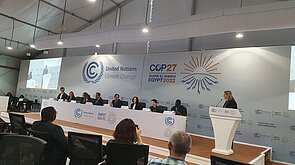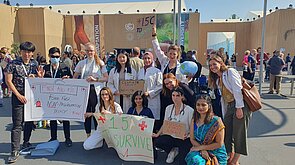Impressions from the 27th climate conference
Small successes, many unanswered questions
A report by Sarah Siemers (BOKU)
At COP26 in Glasgow in 2021, the almost 200 participating countries agreed to set new emission reduction targets at national level. In addition, global warming should be limited to less than 1.5 °C. The final agreement mentioned the further expansion of renewable energies, the phase-out of coal and the abolition of subsidies for fossil fuels. There were also pledges to double funding for climate adaptation to 40 billion dollars and to halt further forest loss. However, Russia's war in Ukraine, the global energy and food crisis and the ongoing COVID-19 pandemic have been a major distraction from actually driving forward climate action on the scale needed.
Expectations for this year's 27th UN Climate Change Conference in Sharm El-Sheikh, Egypt, were therefore very subdued. This was also due to the fact that some NGOs boycotted the conference and refused to take part. On the one hand, they argued that no significant progress can be made on climate protection in a country where there is no freedom of political expression and several climate activists have already been arrested in advance. On the other hand, because they perceived the COP under Egypt's presidency as a greenwashing event. For example, day trips by plane to Cairo or Luxor were offered on the official COP website of the host country. COP 27 also had the highest proportion of representatives from the oil and gas industry to date.
At the planned end of the negotiations last Friday, November 18, there was still no agreement in sight and for a long time it was not clear whether a final document would actually be adopted. After the last plenary session on Sunday morning, the outcome of the negotiations was rather lukewarm. Observers criticized above all the lack of concessions for an early phase-out of fossil fuels - the agreements in this regard did not go beyond the promise of the Glasgow Climate Pact. In addition to renewable energies, other "low-emission" energies were also named as the energy source of the future, which means a further loophole for the development of new fossil fuels. The submission of new and more ambitious nationally determined contributions (NDCs) was also postponed for another year.
However, there was one success for low and middle-income countries in particular. After 30 years, they reached an agreement on a new "Loss and Damage" fund to help them cover the costs of the impacts of the climate crisis. Through this political justice mechanism, the polluter states are now assuming at least partial financial responsibility for the climate damage they have caused through emissions. In practice, however, many questions remain unanswered. For example, it is still unclear who will pay and when, and who exactly will benefit. In theory, however, it is a big step in the right direction.
Even if no ground-breaking result could be celebrated at COP27, the process of the Framework Convention on Climate Change is important to draw the attention of the media and political decision-makers to gaps between the measures required and the concessions made so far. In addition, the COP offers a mechanism that allows for joint action despite political divergences. And not only during the two weeks of the meeting, but also during the rest of the year before the states are held accountable again.




